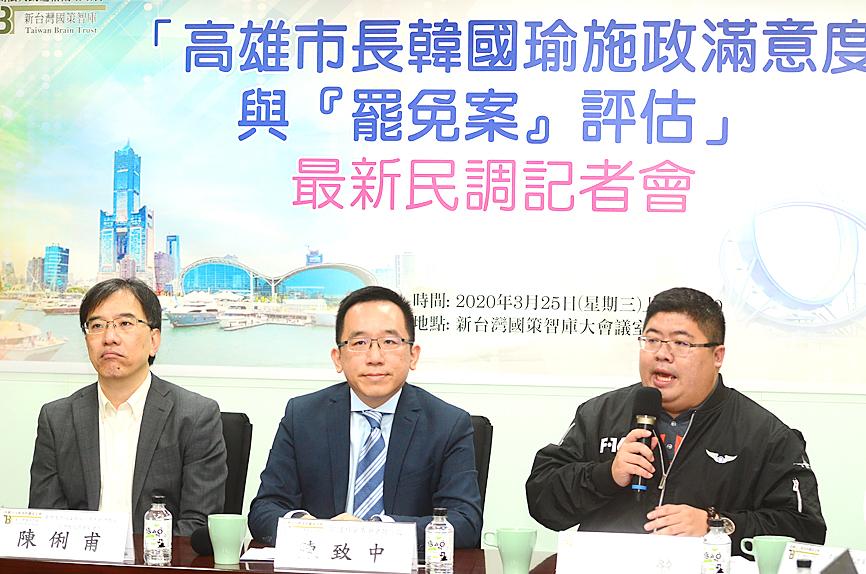Nearly 60 percent of Kaohsiung residents polled said that they would vote to recall Kaohsiung Mayor Han Kuo-yu (韓國瑜), think tank Taiwan Brain Trust, which conducted the survey, said yesterday.
A petition to recall the mayor is undergoing a second review and if it is passed, a vote is to be held in the latter half of June.
Of those polled, 69.7 percent said that they would participate in a vote, while 56 percent said they would still participate if there was a sharp increase in the number of COVID-19 infections.

Photo: Wang Yi-sung, Taipei Times
The data showed that, irrespective of the COVID-19 pandemic, Han would likely be recalled, Taiwan Brain Trust director Wu Shih-chang (吳世昌) said.
“From the results of the survey it is clear that Kaohsiung residents have made up their minds. There seems to be a consensus that Han Kuo-yu has not been given a pass on his performance,” Democratic Progressive Party (DPP) Legislator Tsai Yi-yu (蔡易餘) said.
DPP Kaohsiung City Councilor Chen Chih-chung (陳致中), the think tank’s chief executive, criticized Han’s statements about the advantages his administration had brought to the city.
Han’s claims are not reflected in the performance of his administration, Chen said.
Asked whether they were satisfied with Han as mayor, 59.1 percent of respondents said they were not, while 32.4 percent said that they were.
Asked to grade Han’s performance on a scale of zero to 10, 30 percent of respondents gave a grade of zero, while the average was 3.5.
Of those who voted for Han in the 2018 mayoral election, 28 percent said that they regretted having done so.
Should Han’s recall be put to a vote, 59.5 percent of respondents said they would vote in favor of recalling the mayor, while 34.5 percent said they would vote against a recall.
If the COVID-19 pandemic does not worsen, 60.5 percent of city residents are likely to participate in a recall vote and there would likely be more than 1 million votes in favor of a recall, Wu said.
If the COVID-19 situation worsens, there would be an estimated 48.7 percent voter turnout and an estimated 866,330 votes in favor of a recall, which would still meet the threshold, he said.
A turnout of 30 percent is likely all that would be needed to recall Han, Taiwan Association of University Professors deputy chairman Chen Li-fu (陳俐甫) said.
If a vote takes place, it is likely that Han would become the nation’s first local government head to be recalled, he said.
The survey, conducted on Thursday and Friday last week, collected 1,072 valid samples. It had a confidence level of 95 percent and a margin of error of 3 percentage points.

Taiwan has received more than US$70 million in royalties as of the end of last year from developing the F-16V jet as countries worldwide purchase or upgrade to this popular model, government and military officials said on Saturday. Taiwan funded the development of the F-16V jet and ended up the sole investor as other countries withdrew from the program. Now the F-16V is increasingly popular and countries must pay Taiwan a percentage in royalties when they purchase new F-16V aircraft or upgrade older F-16 models. The next five years are expected to be the peak for these royalties, with Taiwan potentially earning

POSITIVE DEVELOPMENT: Japan and the US are expected to hold in-depth discussions on Taiwan-related issues during the meeting next month, Japanese sources said The holding of a Japan-US leaders’ meeting ahead of US President Donald Trump’s visit to China is positive news for Taiwan, former Japan-Taiwan Exchange Association representative Hiroyasu Izumi said yesterday. After the Liberal Democratic Party’s landslide victory in Japan’s House of Representatives election, Japanese Prime Minister Sanae Takaichi is scheduled to visit the US next month, where she is to meet with Trump ahead of the US president’s planned visit to China from March 31 to April 2 for a meeting with Chinese President Xi Jinping (習近平). Japan and the US are expected to hold in-depth discussions on Taiwan-related issues during the

‘LIKE-MINDED PARTNER’: Tako van Popta said it would be inappropriate to delay signing the deal with Taiwan because of China, adding he would promote the issue Canadian senators have stressed Taiwan’s importance for international trade and expressed enthusiasm for ensuring the Taiwan-Canada trade cooperation framework agreement is implemented this year. Representative to Canada Harry Tseng (曾厚仁) in an interview with the Central News Agency (CNA) said he was increasingly uneasy about Ottawa’s delays in signing the agreement, especially as Ottawa has warmed toward Beijing. There are “no negotiations left. Not only [is it] initialed, we have three versions of the text ready: English, French and Mandarin,” Tseng said. “That tells you how close we are to the final signature.” Tseng said that he hoped Canadian Prime Minister Mark Carney

STAY IN YOUR LANE: As the US and Israel attack Iran, the ministry has warned China not to overstep by including Taiwanese citizens in its evacuation orders The Ministry of Foreign Affairs (MOFA) yesterday rebuked a statement by China’s embassy in Israel that it would evacuate Taiwanese holders of Chinese travel documents from Israel amid the latter’s escalating conflict with Iran. Tensions have risen across the Middle East in the wake of US and Israeli airstrikes on Iran beginning Saturday. China subsequently issued an evacuation notice for its citizens. In a news release, the Chinese embassy in Israel said holders of “Taiwan compatriot permits (台胞證)” issued to Taiwanese nationals by Chinese authorities for travel to China — could register for evacuation to Egypt. In Taipei, the ministry yesterday said Taiwan